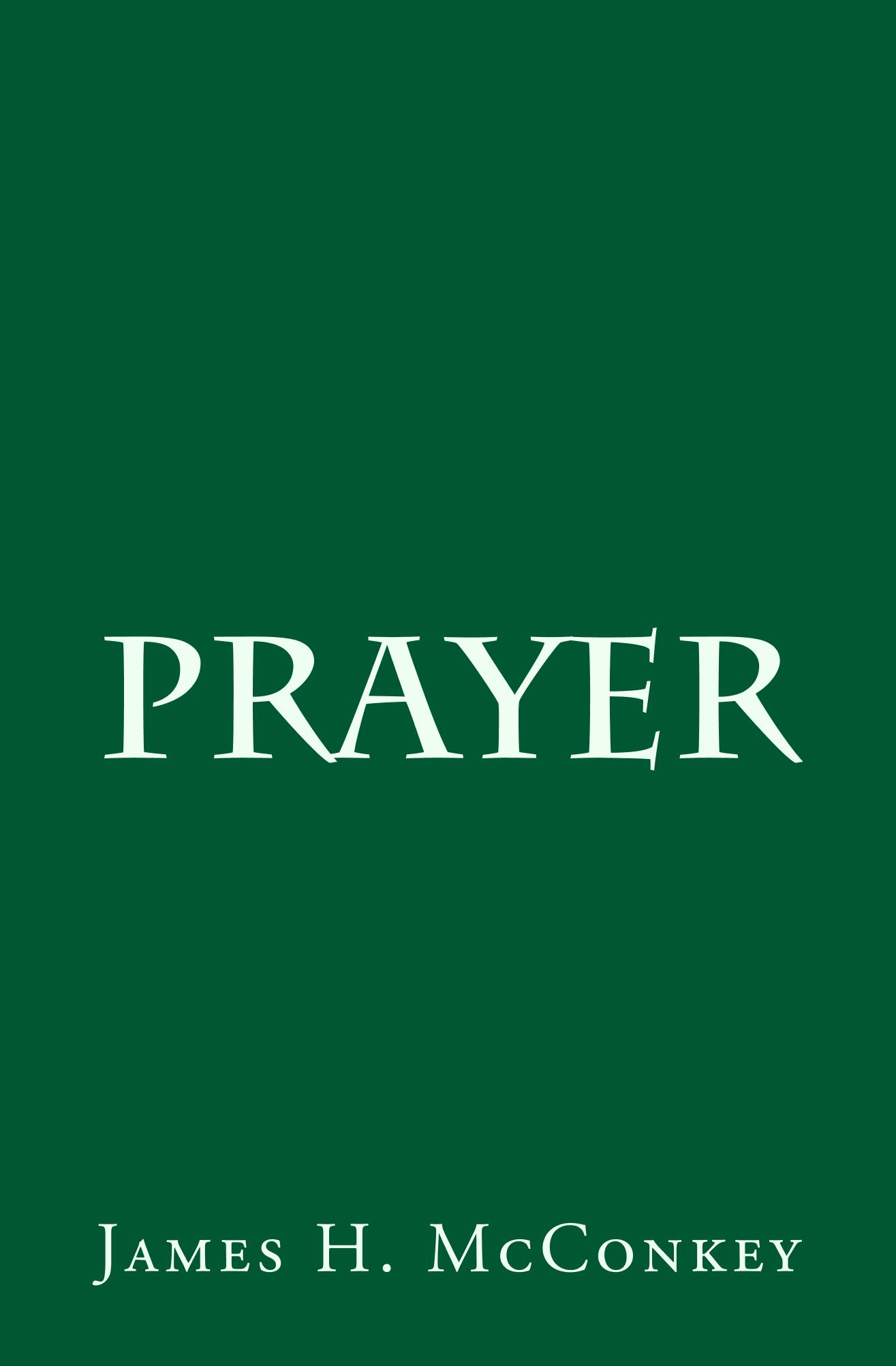Description
Prayer
by
James H. McConkey
2015
I. THE CALL TO PRAYER.
“Pray ye.” – Matt. 9: 38.
The Word of the Father is a call to Prayer.
Everywhere in His Word God calls His children to the prayer life. “Ask, and ye shall receive.” “And He spake a parable unto them that men ought always to pray and not to faint.” “Pray, that ye enter not into temptation.” “Enter into thy closet, shut the door and pray to thy Father.” “After this manner therefore pray ye.” “Pray ye the Lord of the Harvest.” “Pray without ceasing.” “Brethren, pray for us.” “I will therefore that men pray.” “Is any afflicted, let him pray.”
The example of the Son is a Call to Prayer.
Christ’s earthly life was one of unceasing prayer. He prayed at His baptism. He prayed before sending out His disciples. He prayed at the grave of Lazarus. He prayed for Peter that his faith might not fail He prayed on the Mount of Transfiguration. He prayed when they would have made Him King. He prayed at the last supper. He prayed in Gethsemane. He prayed on the cross for His enemies.
If Christ, the only sinless man who ever walked the earth, lived a life of constant communion with the Father through prayer, how much must we weak, fleshly, earth-bound mortals need it. And not only was His life here on earth one of unceasing prayer, but that now when He has ascended into the glory we are told “He ever liveth to make intercession.” Though we may slumber, and forget, and grow careless in intercession, never in the almost two thousand years that have passed since He went up into the heavenlies, has He for one moment ceased to make intercession for His people and His Kingdom. If Jesus the Son of God is living in the glory in ceaseless intercession, surely we poor earthlings dare not belittle nor disobey His call to us to live with Him the life of prayer.
* * * *
The Drawing of the Spirit is a Call to Prayer.
A godly railroad engineer was starting out with his train for the nightly run. The road on which he was running was single track, and at a point about mid-way of his trip he was to meet and pass another train. As his engine plunged forward into the inky darkness he began to think of the oncoming train. Straightway he found himself under a great burden of prayer for the safety of his crew and himself. Try as he would he could not shake off the impression of danger nor the burden of prayer for deliverance from it. “Lord, care for us. Deliver us from any peril that may be threatening us, though unseen,” was his petition. All the way from his starting point to the first station, earnestly and trustfully he kept crying to God. Then the burden of supplication changed to one of joy and assurance and he found himself singing as his train swept on. By and by he drew near to the point at which he was to pass the other train. To his surprise the signal for him to stop was not displayed, but instead the white light of safety shone upon the track. Speeding on past the passing station a half hour’s run brought him face to face with a glaring danger signal. Entering the telegraph office he found the operator white with fear, and was greeted with the question, “Why did you not stop at A?” naming the station at which he was to have met the other train. “Because there was no signal for me to do so,” was his reply.” “Well, H-,” said the operator, “You have had a desperately narrow escape from death sure.” And then the grateful engineer learned that the operator at the station where he was to have met the other train had fallen asleep, and failed to signal his train to stop; that for a half hour the engineer had been running over a piece of track on which the other train was long over-due; but that by a remark able providence this latter train was delayed in starting long enough to prevent the deadly collision which would otherwise have taken place. The same Spirit of God who foresaw the danger had laid upon the heart of His child the burden of prayer concerning it, and then in response to that petition had delivered him from it.
Never disobey this drawing of the Spirit to prayer. It is a special call of God to the individual who is conscious of it. God sees some peril, or great need, in the life or service of one of His own. He chooses some other child to cry to Him concerning it. Tremendous issues may hang upon obedience to that call to prayer. Sad as any neglect of the call to prayer is, the failure to obey this one seems an especial abuse of the grace of God who has honored us by choosing us as His intercessors in such a crisis. Wherefore when you find in your heart this subtle drawing of the Spirit to prayer, steal away and pray it out with God. Some day, even if not in this life, you will see what it meant to God’s Kingdom, to some dear friend in need, and to your own spiritual life.
* * * *
Every Need is a Call to Prayer.
“For He shall deliver THE NEEDY.” – Ps. 72:12.
“It is the needy whom God hears in Prayer. To approach the throne of an eastern king with a petition, one must needs bear costly gifts to win his favor. But ours is a God of grace. “Like as a father pitieth his children, so the Lord pitieth them that fear Him.” He asks no gift of gold or gems, But pending down to us in infinite love He says: “My child how needy are you? What heavy burden is upon you? What grievous sorrow is darkening your faith? What fear of future ill is shadowing your pathway? What spiritual thirst do you want slaked? What barrenness of soul enriched? How hungry, how helpless, how faint, how hopeless are you? What do you need this hour? For I will deliver the needy.” And so the very need that burdens, dispirits and perplexes us is at once the condition and pledge of His blessing. God’s clouds pour refreshing showers upon the sun-parched fields because of their need. God’s sun quickens the seed, feeds the plant, and paints the flower because of need. “He shall deliver the needy * * and him that hath no helper.” Have you reached a crisis in life where the gloom is so dense, the guidance so uncertain, the burden so heavy, that you have come to the end of all your own resources? You have studied and planned, striven and sought, until baffled at every turn you sink in utter defeat and moan, “There is no help for me; I must give up the fight.” Then understand that you are just the man God is looking for – just the one who is ripe for deliverance— just the special individual to whom His promise is made. “For He shall deliver the needy * * and him that hath no helper.” Do not be too afraid of getting into the spot where you have no helper, for that is the spot where, like Jacob, you will meet a delivering God. Do not be too anxious to be free from needs, unless you want to be free from prayer-power. Accept them just as sends them or permits them. The moment you come to a need, remember also that you have come to a promise. “He shall deliver the needy.” To miss a need may be to miss a miracle. As soon as one appears in your life, do not begin to worry because it is there, but praise God because it is to be supplied.
“For He shall deliver the needy when he crieth.”
It is not enough for the soul to be in need. The soul must also cry unto God. Need alone is the begetter of despair. But need with crying is the birth-place of prayer. The very distresses the soul is in are the birth-throes of such prayer. “In my distress I cried unto the Lord.” As out of our sorrow we weep, and out of joy, smile, so God means that out of our need we should cry to Him. He does not say He will deliver the needy when he frets, and worries, and schemes – there is no promise for that – but when he cries. Are you daily crying to God? Is prayer the instinctive habit of your soul in need? In distress is the first impulse of your soul to brood? or to cry? Yield not to that, but to this. For that is begotten of the flesh; this born of God. The instant your soul begins to feel the stress of a need, fly to prayer as you would to the well in thirst, or the loaf in hunger. The sign at the railroad crossing is “Stop, look and listen!” So God’s sign, set up the moment a need crosses your life’s pathway is, cry!
When trouble comes, then ‘‘Call upon me in the day of trouble” Ps. 1:15. When in distress, then “In my distress I cried unto my God” Ps. 18:6. When conscious of weakness, helplessness and poverty, then “This poor man cried and the Lord heard * * and saved.” Ps. 34:6.
* * * *
Every Anxiety is a Call to Prayer.
Why does our Lord admonish us here against anxiety? And why does He set prayer over against it and warn us: – Be anxious in nothing, but in all things – pray?
Because Anxiety hinders our Faith in God.
For faith is simply looking unto Jesus. It is the helpless, needy, tempted soul, conscious of its own weakness and utter inability to cope with the difficulties all about it, and therefore looking away from all these things to God alone as its source of strength and deliverance. Faith thus looks to God. But anxiety looks to things. Anxiety turns the soul’s gaze away from God to the circumstances about us. It causes us to plan and brood about the multitude of things which seek to harass us. In so doing we get our eyes off of God. And this is to lose the attitude of faith. When we look to God, we trust. When we look to things, and circumstances, and surroundings, we grow anxious. “The beginning of anxiety is the end of faith,” says Andrew Murray. When we begin to grow anxious faith languishes. “My eyes are ever unto the Lord, and He will pluck my feet out of the net,” says the wise Psalmist
So long as he keeps looking unto God, God will take care of the nets and pitfalls which are spread in his pathway. This is the walk of faith. But when he himself begins to try to manage the nets and pitfalls, and look away from God he begins to be filled with anxious care, and this is ruinous to faith.
Anxiety hinders the Power of God.
For faith is the channel through which God’s power is poured out upon His children, and in taking us out of the attitude of faith anxiety clogs the downflow of God’s power and blessing into our lives. Witness the hindering of Christ’s power at Nazareth. We are told that “He could there do no mighty works.” And in the literal rendering of this sentence the truth is still more I striking:—“He was there not able to do any mighty work.” What was it that the Son of God could not do, and why could He not do it? Why was it that He was hindered and baffled in His desire to do the mighty deeds, as was His wont, here at His own Home? The answer of the Word reveals the secret—“Because of their unbelief” There was something in them that hindered Him. For there is a condition upon our side to Christ’s doing mighty deeds for us, and that is that we be in the attitude of faith. Anything which hinders that faith hinders Christ’s work. If we are not looking to Him and trusting in Him, the channel through which His power flows to us is closed and He is not able to help us, even though He longs so to do. We wonder sometimes why God does not succor us in our straits. We fear He has left us to ourselves. We are grieved by the seeming hiding of His face. But we do not see that in allowing “The cares of this world” to possess us, we barricade the only pathway over which the power of God travels from heaven to earth to deliver His children. It is not that God is not willing to help us. He is always ready, yea, eager to do that. But He is not able to help us because anxiety had throttled faith, along which alone God is able to act in our behalf.
Anxiety hinders the Peace of God.
In hindering our faith, anxiety not only bars the power of God, but also the peace of God. For peace as well as power comes through faith. “Thou wilt keep him in perfect peace, whose mind is stayed on Thee, because he trusteth in Thee.” Peace is here the “because” of trust. And when anxiety attacks trust it banishes peace. Peace is a gentle dove which sits and broods in restful quiet in the heart of the trustful soul. Anxiety is a fierce vulture which tears the heart of its victim with cruel beak and talon until he bleeds away his very life with anxious care. When the vulture of anxiety enters, the dove of peace takes flight. Since the anxiety hinders our faith in God, breaks the power of God and mars our faith in God, is it any wonder that God calls upon us to hasten to prayer as soon as anxiety looms upon our spiritual horizon? Every anxiety becomes a prayer-signal from God. It is like the railroad man’s red light. It flashes a warning of danger across our pathway. When anxious care begins to creep into our heart God cries out to us: “Stop! You are going to lose your faith. You are going to shut off my power from your life. You are going to mar my peace in your soul. Beware! There is danger ahead. Fly to prayer. ‘Be anxious in nothing, but pray, and my peace shall keep your hearts free from this dread foe of anxious care’”
* * * *
Every Temptation is a call to prayer.
“Watch and pray that ye enter not into temptation.” Matt. 26:41. What an awful trio of foes is arrayed against the Christian in temptation. There is the world; the flesh; and the devil. The world – the foe about us: the adversary – the foe beside us: the flesh – the foe within us. All of these combine in fierce assault upon the believer. Take first the World. How many of God’s children are swept off their feet by the flood of Worldliness about them. They resist manfully the temptation to the greater sins. They shrink from blasphemy, profanity, or impurity. They would scorn the open allurements of the dram shop, or the house of shame. But myriads of them fall easy and unconscious victims to the ever present worldliness which is the subtlest enemy of the church of Christ to-day. Then think of the power of Satan. How David fell a victim of his wiles. How Peter was charged by out Lord with being an instrument in Satan’s hand to try to lure Christ from the path of duty. How fierce was the same adversary’s attack upon Job to draw him away from his God. On all sides we see multitudes going down in shameful defeat before the Prince of Evil. No child of God in his own strength is able for one instant to cope with this crafty foe. Only through Christ can he meet him. Dread foes indeed are these two – the world and the prince of this world. But almost more humiliating than either of these is the foe within the fortress, – the Flesh. The outward enemies are bad enough, but when a traitor within betrays us the shame of defeat is but the greater. To feel the scorching breath of the tempter in his fierce onset; to know the swoon of the soul under the awful assault; and then above all to be conscious of that within ourselves which goes out toward sin and reveals to us the hideousness of the Flesh life; all this makes temptation an awful experience for the soul. And in it all there is but one resort. We must fly to our Lord in prayer. None else but Him has ever overcome this trinity of foes embattled against us. Only in His power, through prayer can we prevail. And mark too that the soul needs to fly to Him immediately. Do not first try to meet the enemy in your own strength, and their call on Christ afterwards. Some argue thus: – “God helps those who help themselves. Do the best you can and then call on the Lord when you have failed.” A beautiful lesson comes to us from Proverbs 30:26, concerning the danger of such a course. “The conies are a feeble folk, yet they make their houses in the rocks.” The cony is a weak, timid little animal like our rabbit or hare. He has no means of defense in himself, so when his foes, the vulture or the eagle, come in sight the cony does not turn at bay and do all he can to defend himself ere he flees. If he did he would be torn to pieces in an instant by his fierce enemies of the air. Nay, the cony has learned a wiser course than this. He knows he is a “feeble folk.” So he rushes straight to “The Rocks.” He lets the rocks defend him without attempting any defence whatever in his own strength, which is but weakness. Likewise is it with us. We are a feeble folk. We are no match against this triple alliance of the World, the Flesh and the Devil, in temptation. If we would seek to do ‘The best we can” in our own strength, we will soon go down in shameful defeat. Our only course is to learn the cony lesson; to fly straight to our Rock, Christ Jesus, in prayer, and trust! the Rock to keep us.
* * * *
Every vision of the world’s Unsolvable Problems is a Call to Prayer – Prayer for the coming of our Lord.
“Even so, come, Lord Jesus.” Rev. 22:20. Where is the Christian man or woman who has not suffered keenest agony from the vision of the unsolvable problems of this poor suffering World. You go forth to minister among lost men. You do all you can to better their sad estate. You point them to the Christ who taketh away the sin of the world. You show them the pathway of light in which they may walk. You counsel them in their perplexities, comfort them in sorrow, strengthen them in weakness. But when you have done your best, and given yourself, your time, your talent, your all, you are still face to face with problems which are utterly beyond your solution. You stand before them overwhelmed with the consciousness of your own utter helplessness. Your sympathy, your tears, your earnest desire to help, are of no avail. The keenest suffering of the servant of God comes from this vision, of the ills which he himself cannot in any way touch or lighten, much less banish from this poor world. There is Death. It enters the home and takes away the dearest object of our heart’s affection. It fills the world with woe unspeakable. It breaks the tenderest ties that link human hearts in one. It spares not our closest flesh and blood. It is the last great enemy yet to be overcome. Before it the bodies of God’s most devoted and faithful children, however busy and successful in His service, must go down into the darkness and corruption of the grave. Even the holiest yield this last tribute to its ravages. Then there is sin. What an awful enemy is here. Think of the broken hearts; the wrecked lives; the fathers and mothers who mourn over wayward sons and daughers; the bleeding wounds that all time cannot heal; the burden of care and grief and shame, which has been piling up since the first day when man broke the law of God and the sentence of death fell upon him for sin. Then we can point men to the blood which takes away the guilt of Sin. But what can we do with the problem of Sin in itself, and its existence here?
Again there is Satan. What a subtle and dreadful foe is he. He goeth about like a roaring lion, tempting, deceiving, devouring. How fierce are his onsets; how terrible his power; how cruel and relentless his pursuit of the objects of his wrath and hatred. And then who shall banish cruel oppression? Who shall drive savage War, with all its horrors, from the face of the earth? Who shall stay the ravages of famine, pestilence, and disease? Who shall free this sad world from murder, suicide, hatred, crime? We might almost picture the aged John, in the lonely island of his exile, looking up toward his departed Lord and crying out in his sorrow: “Lord, I can endure thine own absence in the flesh, for I shall soon see Thee face to face. I can bear the separation from all I loved, for soon I shall be with them. I can endure the loneliness, the suffering, the sadness of it all, for soon my pilgrimage shall end and I shall pass into the glory. I can bear the scorn and contumely of men for these are but part of the tribulation Thou hast promised as my lot here upon earth. But alas for the moan of the world’s agony which comes to me as the surge of the sea which breaks upon this lonely shore. Alas, O Lord, for the sorrow, and sin and suffering which all our efforts cannot undo, all our sympathy cannot banish. What canst Thou do for these in our helplessness, O Lord?” And can we not hear our Lord’s whisper from the skies above, to His beloved disciple: – “I am coming, John, and when I come all these mysteries shall be solved. When I, the Prince of Peace, shall come, wars shall cease. When I, to whom the Kingdom belongs, shall come, oppression shall end, for the Government shall be upon my shoulders and of the increase of righteousness and peace there shall be no end. When I come the power of Sin shall be broken. When I come the last enemy, Death, shall be put under my feet. When I come Satan shall be bound in darkest dungeon. When I come the darkness shall flee away; the sorrowing shall be comforted; the meek exalted to reign; the broken-hearted healed; the glory of God fill the earth as the waters cover the sea.” And with the vision of the glorious triumph of His coming Lord over the evil, and sin, and gloom, and pain, and of His triumphant solution of all those awful problems which well nigh break the heart of His children who serve Him here, is there any wonder that, in an ecstasy of joy at the blessed promise “Lo I come quickly,” John should breathe the last great prayer of the Word of God: –
“EVEN SO, COME, LORD JESUS.”





Reviews
There are no reviews yet.